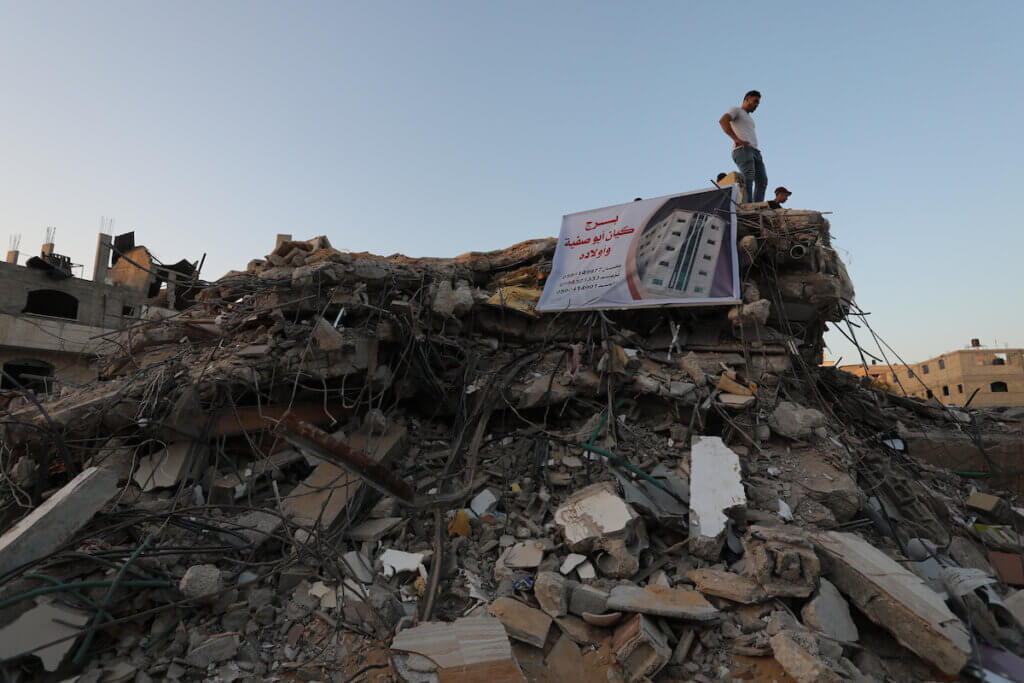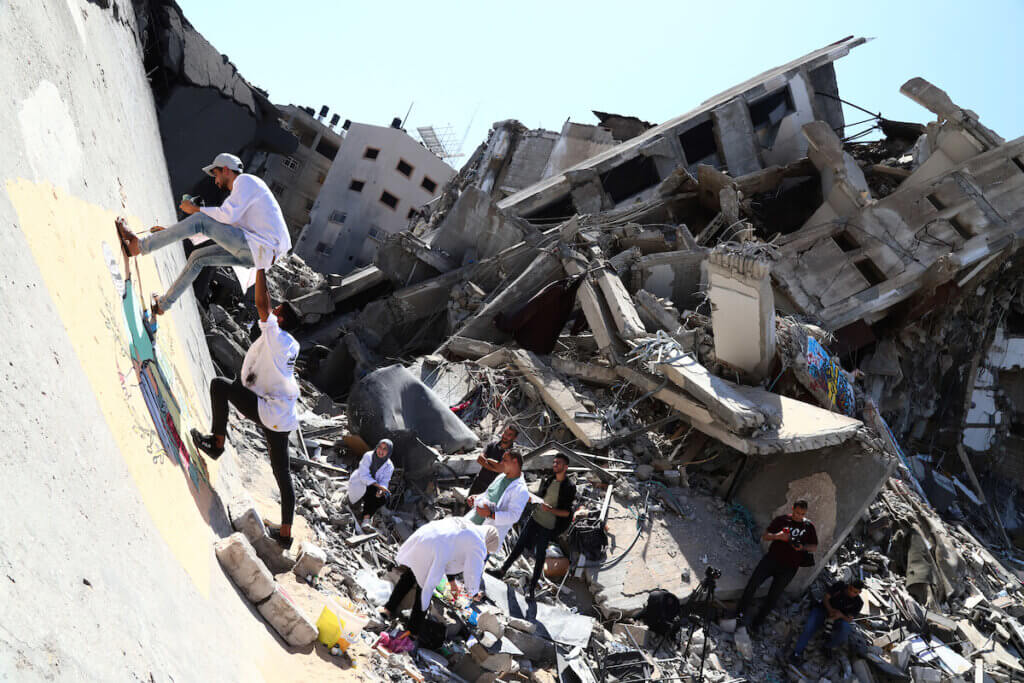Around ten days ago, we, ‘Gazans’ were making world news headlines and trending on social media as we were experiencing the fourth Israeli aggression on our besieged city in the last 15 years.
On May 20th, a ceasefire was announced after 11 consecutive days of intense bombardment that killed 253 people including 66 children, 39 women, and 17 elderly and the injury of 1,948 people.
To the world the aggression was over then. We were no longer trending or in news, except for covering the implication of the aggression on politics, the economy, reconstruction plans, and some humanitarian stories of people who lost family members, homes, or businesses.
What the people outside Gaza may not know is that we are living a daily war now; a war that has started the moment the ceasefire did; a war that is neither photographed nor covered by the media.
What the people outside Gaza may not know is that we are living a daily war now; a war that has started the moment the ceasefire did; a war that is neither photographed nor covered by the media.
Each one of us, the two million people living in the 360 km2 city, has their own inner war now. We are lost in our attempts to return to normal. These attempts usually fail because we can’t sleep at night without nightmares, or we simply can’t sleep at all, because we jump in fear when the door slams or can’t seem to focus on mundane daily tasks.
Survivor guilt
I was telling a friend from the U.S, who works on psychological support projects, how difficult it has been for me after every aggression I lived through since 2008. It has been a struggle to not feel guilty about returning to my routine life; from going to school, university, or work, or even visiting family and friends while other people, including friends and neighbors, are suffering the loss of loved ones or had their homes or businesses destroyed.
As a neighbor, as a friend, and as a Gazan, I feel that I should not have a normal life until all the people I know have their normal lives back too. I also know that this is not an option. We don’t have the time or space to recover, and I find myself living an internal conflict every single day to take care of my kids, see people, go to work, or even laugh!
Based on my conversation with this friend, I learned that there’s a condition in psychology called ‘survivor guilt’ that occurs when a person believes they have done something wrong by surviving a traumatic or tragic event when others did not. I know this feeling.

First days back
The day after the ceasefire was announced, I took my two kids Khalil, age 2, and Seba, age 1, to daycare. When I arrived, all the kids were crying, including my two little children. I wasn’t sure if the crying was due to the changed daily routine, or from the fear of separation from their parents that lived with them over the past 11 days. I was crying too for the latter reason!
It has now been 10 days since the ceasefire was announced. Students are back to their schools and universities, my kids are back to their daycare, and I am back to work, but my heart and mind are not back yet, they are still stuck in the life I led two weeks ago.
I still can’t sleep at night. I can’t get used to the city’s new face with destroyed buildings in almost every neighborhood. I can’t seem to spend enough time with my family and friends since my job involves responding to the urgent humanitarian needs of Gazans after the offensive. Simply, my body and mind are not functioning the same way anymore. I don’t feel like I am the same person anymore.
There is such strong inertia holding me back from things I need or want to do. I pitched this story three days after the ceasefire was announced. I was only able to start 10 days later.
I’m not alone
One way I found helpful to release stress was sharing my thoughts and feelings on Facebook. It was a relief when I knew that I wasn’t the only one going through this. My friends started to share their own struggles of getting back to normal.
Everyone I know reiterated how this aggression feels the most difficult since 2008. Salt on the wounds of 15 years of siege, the Great March of Return, and multiple military escalations.
Everyone I know reiterated how this aggression feels the most difficult since 2008, as Israel started where it stopped in 2014 by targeting residential apartment buildings where hundreds of families lived in the densely-populated Strip. It feels like the salt added to the wounds of 15 years of siege, aggressions, the Great March of Return, and multiple military escalations.
Children too
The people I included in this article were lucky to not have lost a family member, a home, or a business. It’s only a reflection of what people like me, survivors, feel. I can’t begin to describe how difficult it is for others who have lost so much during this aggression.
My friend Mohammed spoke to me about his son Omar, age 5, who with every sound of bombardment told his father out of fear: “my heart is hurting me”. After the aggression was over, Mohammed was having breakfast with his family and his son surprised him saying: “Dad, my heart is still hurting me.”
“I didn’t think that Omar understood what the heart is as he’s so young. I assumed that he was repeating what he may have heard from someone else. I asked him to show me where his pain is and I was surprised when he pointed with his small hand to his heart,” Mohammed said
Another child who surprised me was a girl named Amal, age 7. In a three-minutes video shared on social media, Amal spoke about how sad she was when she saw the streets and buildings destroyed after the war. She also expressed how scared she was during the bombardment by closing her ears and sleeping in the kitchen. The saddest part of her video was when she shared her plans for the future saying: “I’ll become a doctor when I grow up. If the war is back, I’ll be in the hospital and they’ll not target us. It’s a safer place than home.”
Children, it seems, are feeling the same pain, and what differs is only how they express it, if they are even capable of doing so.
‘Tawjihi’ Student
‘Tawjihi’ is the last year of high school, and is the most critical as students’ grades for the year are usually used to assess if they qualify to join the college or university they want.
‘Tawjihi’ students are preparing for their final exams in June, and unfortunately, they don’t have an option to wait until they recover; they need to prepare themselves for the exams as if nothing happened.
Fouad dreams of enrolling at medical school and he was always a top student in his class. But after the aggression, he is not able to concentrate or study for his exams.
“I feel that I’m losing my dream. I’m thinking seriously of postponing doing my exams till next year, I don’t think I’ll be able to get high enough grades to go to medical school,” Fouad told me.
He added: “I keep thinking of the scenes of people under the rubble. I can’t get them out of my mind for a second.”

Opposite the rubble
Saeed, age 79, lives in the Al-Rimal area in Gaza City, one of the better neighborhoods in Gaza that includes residential and commercial buildings. Saeed is used to spending the evening hours sitting across the street from his house playing backgammon with a friend.
Al-Rimal witnessed intensive bombardment all throughout the 11 day-aggression, including a building right across from Saeed’s home.
“Israel killed the beauty of Gaza. I lost my desire in life after I lost the only thing I enjoyed doing with my only friend.” Saeed said.
While we all feel this has been the most difficult aggression yet, I think that we may have felt the same way in 2014, in 2012 and 2008! And with every round of violence, we’re left to battle this guilt, that yet again, we survived to live another day until the next aggression comes. I am not sure there is a definition for a “repeated” survivor guilt, but all of us two million Gazans can help psychologists create one.
I wrote these lines after 2014, and I can’t find a more apt ending to this article:
The killing is over but the pain of the missing dead is not.
The killing is over but the injured are not healed.
The killing is over but the houses are no longer standing.
The killing is over but our souls are not yet healed.
Sarah Algherbawi
Sarah Algherbawi is a freelancer writer and translator from Gaza.
So where are the Palestinian voices in mainstream media?
Mondoweiss covers the full picture of the struggle for justice in Palestine. Read by tens of thousands of people each month, our truth-telling journalism is an essential counterweight to the propaganda that passes for news in mainstream and legacy media.
Our news and analysis is available to everyone – which is why we need your support. Please contribute so that we can continue to raise the voices of those who advocate for the rights of Palestinians to live in dignity and peace.
Palestinians today are struggling for their lives as mainstream media turns away. Please support journalism that amplifies the urgent voices calling for freedom and justice in Palestine.
Related posts:
Views: 0
 RSS Feed
RSS Feed

















 May 31st, 2021
May 31st, 2021  Awake Goy
Awake Goy  Posted in
Posted in  Tags:
Tags: 
















